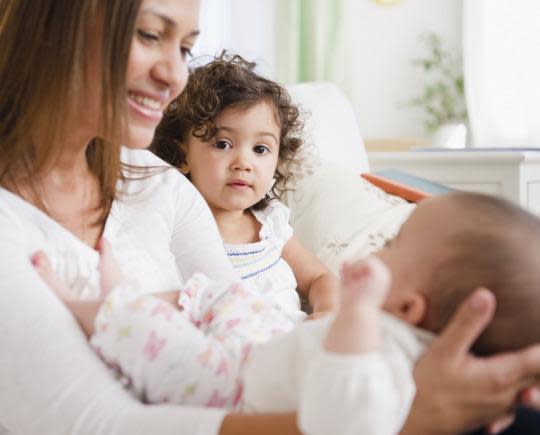The Dark Side of When a Parent Favors One Child Over Another

Playing favorites with your kids can have unforeseen and lifelong consequences. (Photo: Getty Images)
The 911 call came in early in the morning on Aug. 18: A young mom calmly told the dispatcher that her infant son had stopped breathing. After police arrived at the family’s Ohio apartment, the baby, 3-month-old Noah, was taken to a hospital — where he was pronounced dead.
STORY: Is It Really So Bad to Have a Favorite Child?
But this was no accidental tragedy. After being questioned by police, mom Brittany Pilkington, 23, confessed to not only killing Noah but also ending the lives of her two other sons: 4-year-old Gavin, found dead on Apr. 6, and Niall, 3 months, who died in July 2014.
Pilkington smothered all three boys on separate occasions, she admitted to law enforcement, because her husband favored his sons over the couple’s daughter, Hailey, who is 4.
“In her mind, she was protecting her daughter from being not as loved as the boys were by their father,” Logan County, Ohio prosecutor William Goslee told the Columbus Dispatch. Hailey is now in the custody of child protective services, and her mom is in the county jail.
STORY: 6 Things to Do When Sibling Rivalry Turns Into Bullying
This horrific story is probably more about mental illness on the part of a mom, not what happens when parents play favorites with their children. But it raises the question: What are the damaging consequences to the family dynamic when one parent prefers one kid over another — something researchers say is extremely common and often due to emotional closeness, having compatible attitudes, or just being of the same gender?
“Parental favoritism is totally natural — it’s normal to feel more of an affinity or connection toward one child,” Beverly Hills family and child psychotherapist Fran Walfish tells Yahoo Parenting. “But it becomes the root cause of a lot of family problems when a parent begins to treat the favored child differently,” she says, and those problems can persist throughout siblings’ lives.
The less-favored kid who picks up on this is more likely to have disciplinary problems and get involved in drugs, she says, and can be the cause of family disruptions.
A 2013 study bears this out, finding that kids who are victims of “differential parenting,” as playing favorites is called, showed more emotional problems than their siblings — though, interestingly, all of the children in a household showed higher rates of mental issues at the end of the study than when it began.
Favored kids also tend to end up more “enmeshed” with a parent who discourages that child from separating fully and becoming independent. They can also build up a sense of entitlement, says Walfish.
The child who isn’t favored may also develop a more submissive personality and be more likely to get into relationships where they’re not treated well, says Walfish. “It’s like they don’t feel they deserve to be treated well,” she adds. Resentment often follows.
The key is to acknowledge privately to yourself that you have a favorite, then do everything you can to balance things out, so in the eyes of your children, they feel they are all appreciated and adored.
“Strive for fairness and justice and make things as even as possible,” says Walfish. “And if you find that you can’t do this, and one child is rightly feeling undervalued or ignored, get professional help.”
Please follow @YahooParenting on Facebook, Twitter, Instagram, and Pinterest. Have an interesting story to share about your family? Email us at YParenting (at) Yahoo.com.

